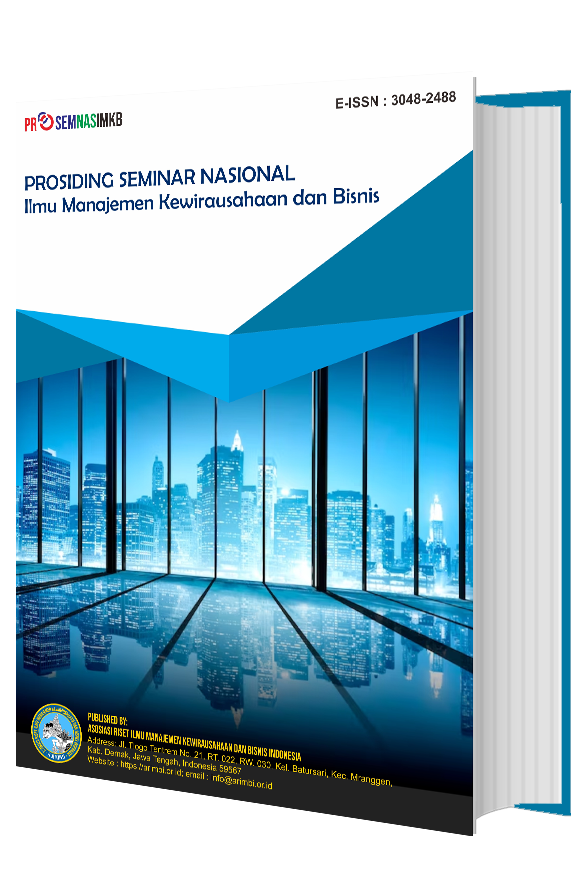Perjalanan Emosional dan Psikologis Pelaku UMKM Perempuan dalam Mengelola Usaha Kecil
DOI:
https://doi.org/10.61132/prosemnasimkb.v2i1.167Keywords:
Dual Roles, Emotional Coping, Social Support, Spirituality, Women's MSMEsAbstract
Women entrepreneurship in Micro, Small, and Medium Enterprises (MSMEs) plays a vital role in the local economy. However, women entrepreneurs often face complex emotional and psychological challenges due to their dual roles as housewives and entrepreneurs. Market uncertainty, social pressure, and lack of support from their environment further burden their workload. This study aims to explore the subjective experiences of women micro MSMEs, particularly in dealing with the psychological pressures of carrying out these roles. The research method used is a qualitative phenomenological approach with seven informants from the culinary, handicraft, and online trading sectors. Data were collected through semi-structured interviews and non-participant observation, then analyzed using a thematic approach based on the Miles & Huberman model. The results of the study revealed four main themes: (1) the pressure of dual roles that often trigger stress and emotional exhaustion (burnout), (2) chronic anxiety related to fear of business failure and income instability, (3) spirituality and religious activities as meaning-based coping mechanisms, and (4) the importance of social support from partners, family, and community as a balance of emotional conditions. These findings confirm that the success and sustainability of women's businesses depend not only on economic capital or technical skills, but are also significantly influenced by mental health and the strength of social networks. Therefore, empowerment programs for women's MSMEs need to be designed holistically, encompassing psychosocial aspects, coping strategy training, and strengthening supportive and inclusive social networks.
Downloads
References
Badan Pusat Statistik. (2023). Statistik UMKM nasional tahun 2023. BPS RI.
Bandura, A. (1997). Self-efficacy: The exercise of control. Freeman.
Creswell, J. W. (2013). Qualitative inquiry and research design: Choosing among five approaches (3rd ed.). Sage Publications.
Dewi, A. P., & Lestari, M. D. (2020). Kesejahteraan psikologis perempuan pelaku UMKM di masa pandemi COVID-19. Jurnal Psikologi, 17(2), 145-160.
Goode, W. J. (1960). A theory of role strain. American Sociological Review, 25(4), 483-496. https://doi.org/10.2307/2092933
Greenhaus, J. H., & Beutell, N. J. (1985). Sources of conflict between work and family roles. Academy of Management Review, 10(1), 76-88. https://doi.org/10.2307/258214
Guest, G., Bunce, A., & Johnson, L. (2006). How many interviews are enough? Field Methods, 18(1), 59-82. https://doi.org/10.1177/1525822X05279903
House, J. S. (1981). Work stress and social support. Addison-Wesley.
Kementerian Koperasi dan UKM Republik Indonesia. (2022). Profil UMKM tahun 2022. Kemenkop UKM.
Kementerian Koperasi dan UKM Republik Indonesia. (2023). Profil UMKM tahun 2023. Kemenkop UKM.
Koenig, H. G., McCullough, M. E., & Larson, D. B. (2001). Handbook of religion and health. Oxford University Press. https://doi.org/10.1093/acprof:oso/9780195118667.001.0001
Lazarus, R. S., & Folkman, S. (1984). Stress, appraisal, and coping. Springer Publishing Company.
Lincoln, Y. S., & Guba, E. G. (1985). Naturalistic inquiry. Sage. https://doi.org/10.1016/0147-1767(85)90062-8
Mahadea, D., & Pillay, M. K. (2008). Environmental conditions for SMME development in a South African province. South African Journal of Economic and Management Sciences, 11(4), 431-448. https://doi.org/10.4102/sajems.v11i4.269
McGowan, P., Redeker, C. L., Cooper, S. Y., & Greenan, K. (2012). Female entrepreneurship and the management of business and domestic roles: Motivations, expectations and realities. Entrepreneurship & Regional Development, 24(1-2), 53-72. https://doi.org/10.1080/08985626.2012.637351
Miles, M. B., Huberman, A. M., & Saldaña, J. (2014). Qualitative data analysis: A methods sourcebook (3rd ed.). Sage Publications.
Oakley, A. (1974). The sociology of housework. Martin Robertson.
Pargament, K. I. (1997). The psychology of religion and coping: Theory, research, practice. Guilford Press.
Patton, M. Q. (2002). Qualitative research and evaluation methods (3rd ed.). Sage Publications.
Roomi, M. A., & Parrott, G. (2008). Barriers to development and progression of women entrepreneurs in Pakistan. The Journal of Entrepreneurship, 17(1), 59-72. https://doi.org/10.1177/097135570701700105
Sarfaraz, L., Faghih, N., & Majd, A. A. (2014). The relationship between women entrepreneurship and gender equality. Journal of Global Entrepreneurship Research, 2(1), 1-11. https://doi.org/10.1186/s40497-014-0011-3 https://doi.org/10.1186/2251-7316-2-6
Taylor, S. E. (2002). Health psychology (5th ed.). McGraw-Hill.
Wulandari, A. S. (2020). Beban emosional dan strategi koping perempuan pelaku UMKM. Jurnal Psikologi Sosial, 8(1), 33-44.
Downloads
Published
How to Cite
Issue
Section
License
Copyright (c) 2025 Prosiding Seminar Nasional Ilmu Manajemen Kewirausahaan dan Bisnis

This work is licensed under a Creative Commons Attribution-ShareAlike 4.0 International License.






